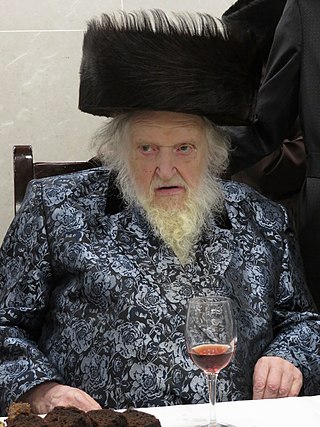List of Midrasha and seminary programs:
- See also List of yeshivas, midrashas and Hebrew schools in Israel#Midrashas.
List of Midrasha and seminary programs:
Those in the West Bank are marked 'WB', those in East Jerusalem are marked 'EJ'.
In Beit Shemesh and Ramat Beit Shemesh:
In Bayit VeGan:
In Gilo:
In Givat Shaul:
In Har Nof:
In Kiryat HaYovel:
In Kiryat Moshe:
In Malha:
In Mattersdorf:
In the Old City:
In Pat:
In Ramat Eshkol:
In Ramat Shlomo:
In Ramot:
In Romema:
In Talpiot:
In Zichron Moshe:

Beit Shemesh is a city located approximately 30 kilometres (19 mi) west of Jerusalem in Israel's Jerusalem District. A center of Haredi Judaism and Modern Orthodoxy, Beit Shemesh has a population of 170,683 as of 2024.

Mercaz HaRav is a national-religious yeshiva in Jerusalem, founded in 1924 by Ashkenazi Chief Rabbi Abraham Isaac Kook. Located in the city's Kiryat Moshe neighborhood, it has become the most prominent religious-Zionist yeshiva in the world and synonymous with Rabbi Kook's teachings. Many Religious Zionist educators and leaders have studied at Mercaz HaRav.
Midrasha is a Hebrew term currently used for three types of educational institutions:

Tomchei Tmimim is the central Yeshiva of the Chabad-Lubavitch Hasidic movement. Founded in 1897 in the town of Lubavitch by Rabbi Sholom Dovber Schneersohn, it is now an international network of institutions of advanced Torah study, the United Lubavitcher Yeshivoth.
Dushinsky is one of the few Hasidic dynasties not named after the place where it originated; instead, it is named after the rebbe's surname. It is relatively new, and became a dynasty in Jerusalem, where it is centered today. Unlike other Hasidic groups, it does not originate from a Hasidic background, but from the talmidim (students) of Moses Sofer.
A Jewish seminary is a Jewish educational institution. See Hebrew Union College-Jewish Institute of Religion (Reform), Jewish Theological Seminary (Conservative), Yeshiva University (Orthodox), Reconstructionist Rabbinical College, Academy for Jewish Religion

Hardal usually refers to the portion of the Religious Zionist Jewish community in Israel which inclines significantly toward Haredi ideology. In their approach to the State of Israel, though, they are very much Zionist, and believe that Israel is Atchalta De'Geula.

Yeshivat Kerem B'Yavneh is a youth village and major yeshiva in southern Israel. Located near the city of Ashdod and adjacent to Kvutzat Yavne, it falls under the jurisdiction of Hevel Yavne Regional Council. In 2022, it had a population of 536.
The Tal Institute/ Machon Tal, founded in 1999, is the main women's division of the Jerusalem College of Technology. It is located in the Givat Shaul neighborhood of Jerusalem. Over 1,000 students from Israel and around the world study there. The uniqueness of the Machon Tal is that it combines engineering and/or management studies with the study of Torah. It is also the only religious school in Israel to offer an academic degree in Nursing. The academic studies are offered at a university level, with full recognition from the Council for Higher Education in Israel. The students come from a broad range of religious backgrounds in Israel and the Diaspora. Due to the large number of olim, the Tal Institute also has a New Olim Department. The department assists the new immigrants in various ways from tutoring in difficult subjects to extra time on tests.

Neve Yerushalayim is the oldest and largest college for Jewish women in the world. Founded in 1970 to educate baalot teshuva in the why and how of living an Orthodox Jewish life, Neve has approximately 35,000 alumni. Its campus in the Har Nof neighborhood of Jerusalem is also home to 11 schools and seminaries for post-high school, undergraduate, and graduate students from religious backgrounds.

Moshe Sternbuch is a British-born Israeli Haredi rabbi. He serves as the ga'avad of the Edah HaChareidis in Jerusalem, and the rabbi of the Gra Synagogue in the Har Nof neighbourhood.

Kiryat Unsdorf, also known as Sorotzkin, after its main street, is a Haredi Jewish neighborhood in Jerusalem. It is located along the northern edge of the mountain plateau on which central Jerusalem lies. Constructed between 1970 and 1985, Unsdorf is home to several landmark educational centers. A large percentage of residents are American-born.

Lifshitz College of Education is a religious teacher training college in Jerusalem, Israel. The school credo is "integrating modernity and Jewish life."
The Talpiot College of Education is a religious teacher training college in Holon, Israel. It prepares teachers “in the spirit of the Mamlachti dati education system”.
The 1967–68 Israel State Cup was the 29th season of Israel's nationwide football cup competition and the 14th after the Israeli Declaration of Independence.
The 1969–70 Israel State Cup was the 31st season of Israel's nationwide football cup competition and the 16th after the Israeli Declaration of Independence.
The 1970–71 Israel State Cup was the 32nd season of Israel's nationwide football cup competition and the 17th after the Israeli Declaration of Independence.
Municipal elections took place in Israel on 2 November 1993. They were the first in which Meretz and United Torah Judaism, who were founded after the previous round of municipal elections, stood candidates.